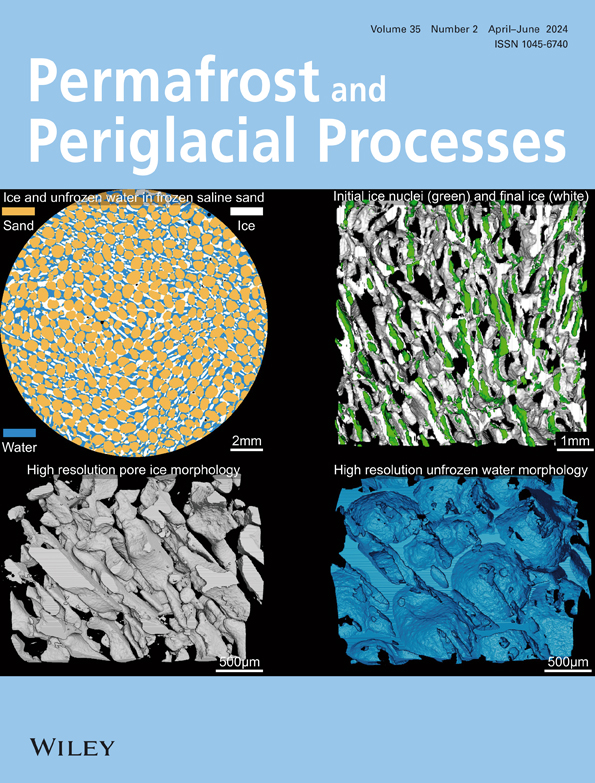Talus and its cooling effects on the thermal regime of permafrost: A review
IF 3.3
3区 地球科学
Q2 GEOGRAPHY, PHYSICAL
引用次数: 0
Abstract
Talus, as the product of movement and accumulation along the slope after the cracking of cliffs or steep rock walls, is a common landform in the mountain periglacial environment. Significant thermal anomalies within talus have been widely reported to be a result of cooling effects. During the cold season, the increased temperature difference between talus and the ambient environment strengthens the intensity of convection (vertical flows) and transforms into upward advection (lateral flows) and exhausts the internal warm current. During the warm season, heat is concentrated on the surface of the talus, and the internal dominant cold current moves downward along the slope by advection. The principle of the proactive cooling effects of talus has been widely utilized in railway construction within permafrost regions as embankments to alleviate degradation of the underlying permafrost. However, limited model studies have examined the cooling effects of blocky debris in nature, and in situ observations are rare. Therefore, it will be important to increase observations and develop process‐based models that couple heat conduction, convection/advection, water transfer processes, and even the latent heat of phase change. This will help to better understand the extent of the cooling effects and its impact on the thermal regime of permafrost.距冰及其对永久冻土热机制的冷却效应:综述
滑石是悬崖或陡峭岩壁开裂后沿斜坡运动和堆积的产物,是山地冰川环境中常见的地貌。据广泛报道,滑石内部的显著热异常是冷却效应的结果。在寒冷季节,距状体与周围环境的温差增大,对流(垂直流)强度增强,并转化为向上平流(横向流),排出内部暖流。在温暖季节,热量集中在距土层表面,内部主导冷流通过平流沿斜坡向下移动。滑石的主动冷却效应原理已被广泛应用于永久冻土地区的铁路建设中,作为减轻下层永久冻土退化的路堤。然而,对自然界块状碎屑冷却效应的模型研究十分有限,现场观测也十分罕见。因此,必须增加观测并开发基于过程的模型,将热传导、对流/平流、水转移过程甚至相变潜热结合起来。这将有助于更好地了解冷却效应的程度及其对永久冻土热机制的影响。
本文章由计算机程序翻译,如有差异,请以英文原文为准。
求助全文
约1分钟内获得全文
求助全文
来源期刊
CiteScore
9.70
自引率
8.00%
发文量
43
审稿时长
>12 weeks
期刊介绍:
Permafrost and Periglacial Processes is an international journal dedicated to the rapid publication of scientific and technical papers concerned with earth surface cryogenic processes, landforms and sediments present in a variety of (Sub) Arctic, Antarctic and High Mountain environments. It provides an efficient vehicle of communication amongst those with an interest in the cold, non-glacial geosciences. The focus is on (1) original research based on geomorphological, hydrological, sedimentological, geotechnical and engineering aspects of these areas and (2) original research carried out upon relict features where the objective has been to reconstruct the nature of the processes and/or palaeoenvironments which gave rise to these features, as opposed to purely stratigraphical considerations. The journal also publishes short communications, reviews, discussions and book reviews. The high scientific standard, interdisciplinary character and worldwide representation of PPP are maintained by regional editorial support and a rigorous refereeing system.

 求助内容:
求助内容: 应助结果提醒方式:
应助结果提醒方式:


